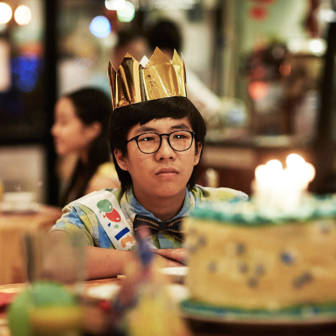This article reveals some elements of the plot of The Slap.
FOR ME, it was the interview with Christos Tsiolkas on ABC’s Lateline – in place of the ubiquitous parliamentarian or the occasional policy wonk – that confirmed the position of his award-winning book, The Slap, in the zeitgeist. That may seem strange, since plenty of people were already talking and writing about the novel and the modern-day dystopia experienced by its protagonists. It had already won the glowing praise of many reviewers, wowed the judges of the Commonwealth Writers’ Prize and started appearing with frequency in the clutches of commuters on public transport. It now sits atop the country’s bestseller lists – and not just those of the independent bookstores. The recent sale of the TV rights has made it official: The Slap is now more than a book – it has become part, if not the effective instigator, of a national conversation about families and children.
When Australians respond to stories about themselves, this is surely to be celebrated. But, despite the hype, it is debatable just how meaningfully The Slap captures contemporary Australian life. It certainly succeeds as an entertaining and absorbing, if not particularly lyrical, read. At times Tsiolkas’ characters convey sentiments with such searing clarity that what is said or thought cannot help but resonate with different readers. The fact that the story is told, Rashomon-style, through the eyes of eight interconnected people only enhances this possibility. But does the novel really manage to illuminate the thornier, but perhaps more mundane, problems of raising children and maintaining marriages and friendships?
The essence of the story is simple. In a first chapter of mounting tension, family and friends gather in a suburban backyard for a barbeque. As is the way of such occasions, affectionate companionship, small talk and the odd bitter exchange are all part of the mix. Friction is generated among a number of the guests over jobs, values and differing cultural backgrounds – and the party is increasingly punctuated by the petty battles of the children present. One little boy, Hugo, is a particular handful – spoilt by his parents, the drunken Gary and dippy Rosie. During a game of backyard cricket, tempers flare and Hugo receives the slap of the book’s title, not from either of his parents but from another adult, the host’s cousin Harry. Pandemonium not so surprisingly ensues and the gathering breaks up with threats of legal action, but not before Hugo tearfully declares, “No one is allowed to touch my body without my permission.” Herein lies the central question of the book. Superficially it may be seen as a “how” question, about the acceptability of corporal punishment. But really it is all about “who” – Tsiolkas is interested in where responsibility lies for ensuring that the single-minded selfishness of a baby (it is significant that, although almost four years of age, Hugo is yet to be weaned) gives way in the young (and not so young) to a respect and consideration for others. Integral to this question is a related one about the implications of affluent Western society’s apparent privileging of childhood in recent years.
When Hillary Clinton advised “it takes a village” I’m pretty sure she wasn’t advocating the thumping of kids by strangers. Tsiolkas isn’t either. But, like the then First Lady, he has his eye on the interconnectedness of domestic relationships as the key to the kind of young people a society produces. In interviews, the author has revealed that one of the catalysts for The Slap was his encounter with a gang of rowdily offensive teenage boys on a crowded suburban train. But in the novel that has resulted, the young people are all pretty likeable and it is the adults in middle age who wreak havoc – on others but also, a lot of the time, on themselves.
The main oppositional forces in the book are Harry and Rosie. Tsiolkas’ clever shifting of perspective throughout the story enables more to be gradually revealed about the actors in his suburban drama as the story progresses, but I cannot help thinking that he misses an opportunity by making the key protagonists as extreme as he does. Harry, it emerges, has form in the aggro department and isn’t so much a guy pushed to his limits as one who is never far from them. We are left in no doubt that, although a proud and loving father to his own boy, he is otherwise a misogynistic thug, enjoying a relationship with a mistress that is just shy of outright prostitution and dabbling in minor criminal activity on the side. He is a character with plenty of angles for his creator to explore, but how much more confronting to readers would it have been if they could more easily recognise themselves – frazzled, tired or disapproving – in the person who could strike another’s child?
At the same time, it is hard to imagine anyone warming too much to Rosie, Hugo’s indulgent and self-righteous mother. It is hard not to scoff at a character who announces that she has dispensed with showering on weekends so as to teach a four year old about water restrictions. In a disturbing coda to the chapter told from her perspective, Tsiolkas has Rosie reflect on her troubled teenage years and acknowledge that “she was a slut” – dirty trash with “bad blood” who, even now, others see as tarnished. The point of this seems to be to emphasise that any sense of worth that Rosie has is derived solely from her role as a mother. While that provides a neat contrast with her two professionally successful friends, the choice to make Rosie as broken as Harry is latently violent cannot help but drive the conflict at the heart of The Slap further away from the difficult interactions which generally rational adults may have with each other about parenting and the behaviour of their children.
Despite, or indeed because of, her best efforts, Rosie is a lousy parent in the sense of equipping her son to grow into a happy and thoughtful young person. In nurturing their bond she virtually ensures his isolation from all others. Unlike Hector and Aisha, the hosts of the barbeque, who are surrounded by extended family, Rosie and Gary are cut adrift from their own relatives. What is more, Gary, excluded by Hugo’s intimacy with Rosie, clearly resents his son.
This is one of the more interesting issues raised by The Slap – the dislike parents can feel for their own children. His father’s disconnection from Hugo is due not just to Rosie’s near obsession with the boy, but also to the fact that Gary is, at heart, a deadbeat. More challenging is Hector’s almost unconscious distaste for his pudgy pubescent son. This is alluded to in mere glimpses of his, or his wife’s, thoughts. But it is a far more taboo topic than many of the others Tsiolkas places at centre stage – namely infidelity (which is practised with a solid respect for cliché: older man with schoolgirl; fling at an overseas conference) and abortion (handled with similar predictability). Both of these, with minor variations, are such ubiquitous plot devices in accounts of suburban disenchantment – across the spectrum from Revolutionary Road to Home & Away – that Tsiolkas might as well be colouring from numbers.
At one point in The Slap, a character wonders whether the world is divided into three genders – men, women and “women who choose to have nothing to do with children.” There may be something in this, but again Tsiolkas displays a preference for the obvious over the complex. Despite having some of the book’s tartest and funniest lines, the hard-bitten Anouk, representing this “third gender,” is essentially a caricature of the careerist childless woman – as hackneyed now as it was in the heyday of that tiresome 1980s soap thirtysomething. The truth of any supposed “third gender” is, of course, that it is comprised simply of women who do not have children – for whatever reason, but often not due to any choice of their own. Sure, women’s career goals are not irrelevant, but rather than being an isolated consideration it would seem far more common for them to intersect with the difficulty of finding a committed partner or the tragedy of infertility. One suspects that the impact of these other phenomena are more prevalent, not to mention more interesting, than a woman with options rejecting motherhood to pursue a literary career (not, as the saying goes, that there is anything wrong with that).
FRUSTRATINGLY, Tsiolkas again indicates he is not oblivious to these more complex issues through a few references towards the end of the book to Harry’s wife falling pregnant after several years of “trying.” But not only is her story relegated to a faint backdrop while that of Anouk is given direct exposition, no evident link is made between the efforts at the heart of Harry’s marriage to conceive another child and the depths of his own simmering anger and frustration. The effect of childlessness on both women and men – and how this truly shapes their attitude to any children in their lives and those living in their community – is unexplored here. That our society still does not quite know how to regard those who are not, for whatever reason, “breeders” is, however, slightly more satisfactorily highlighted.
A truly contemporary theme on to which Tsiolkas does undoubtedly latch is that of vanity – particularly in males. Cousins Harry and Hector are in their early forties but still strive to define themselves through their good looks and physical fitness. The onset of middle age has apparently never seemed more frightening than in today’s youth obsessed culture and this is far from confined to how women feel about their bodies. The men constantly appraise themselves, each other and their partners – but in this perhaps they are aping the competitiveness and insecurity of the women in their lives. At one point Aisha reflects that while she may not particularly like her husband Hector, she takes great pride in his appearance and their attractiveness as a couple. This, far more than any emotional connection between them, she fears losing.
The futility of these efforts to retain vigour and beauty are exposed with great pathos through the character of Hector’s father, Manolis. The sad reminiscences triggered by his attendance at the funeral of an old friend and the general bewilderment of the older generation with the affluence and messiness of their children’s existence are the most affecting part of this tale. For all our frantic endeavours to live fabulous lives with fulfilling jobs and indulged children ferried around in designer prams and silver four-wheel drives, our worlds will eventually shrink and we will resign ourselves to life’s disappointments and our own diminishing relevance to those coming after us.
The Slap also challenges the popular pretence that twenty-first century Australia is a classless society. But it is not stratified in ways that lend themselves to easy categories. The family of Greek immigrants Manolis and his wife Koula has prospered here through hard work, and Harry in particular enjoys a lifestyle that we now expect to come with success. Quite apart from any grief they cause him through their pursuit of legal action over his hitting Hugo, Harry despises Gary and Rosie as losers who rent a shabby house. Gary is the archetypal argumentative “bogan,” with chips on both shoulders, who drinks to excess. People with these flaws certainly exist, but it is pretty galling to see the disdain with which Gary is viewed by Manolis and his family as just one example of the degeneracy of Anglo-Australia. Tsiolkas suggests that those who have arrived through post-war immigration are the drivers of the newly emergent “aspirational” class of Australians. In this he may well be correct, but the generalisation is discomforting all the same. Gary is another character reduced to a one-dimensional representation, diverting the complexities that the book claims to explore into avenues all too familiar in a society that is quick to judge bad parenting and hates bludgers. In any case, aspiration evidently has its limits – as is made clear when one of the book’s well-off characters claims he cannot be a man “who sends his children to private schools.”
With so many screwed up adults running the show, what hope is there for the future? At various points in The Slap adults decry the rudeness and self-obsession of Generation Y (or are we already up to Gen Z?). While this is sure to echo with anyone over thirty, we might ask whether the true horror of young people is their occasional ghastliness, or whether it’s the realisation of what has slipped through our own fingers. It is striking that the only completely honest relationship in the book is that between two teenage friends, Connie and Richie. Each has their problems, but their mutual respect, trust and, yes, love demonstrate that, despite the talent of adults in the throes of a mid-life crisis for self-sabotage, in the best of our relationships lies our strength. It is tempting to think that with these two young people Tsiolkas finally transcends cliché. Or is it simply that, by contrast, the disaffection and tribulations of the forty-something middle-classes are inevitably formulaic?
If that is so, then the point is well made – but it is hardly revelatory stuff. I tend more to the view that The Slap, while skimming on the surface of debates about modern domesticity, avoids diving beneath the surface to the more confronting, and yet more germane, issues facing the generation currently responsible for the direction of our society and our kids’ happiness and sense of self-worth.
Perhaps those stories, playing out in homes all over the country, lack the edgy, sexy vibe Tsiolkas maintains throughout this book. But that doesn’t make them less real or undeserving of a novelist’s attention. •





